Virtual reality (VR) showrooms are revolutionising the car sales landscape in the UK. They offer an immersive experience, allowing customers to explore vehicle features and configurations from the comfort of home. This technology not only enhances buyer engagement but also provides dealerships with a competitive edge. As traditional sales methods face challenges, VR presents a unique solution to attract tech-savvy consumers and boost sales. Discover how this innovative approach is reshaping the industry and driving new opportunities for growth and connection.
Introduction to VR Showrooms in the UK Automotive Market
Virtual Reality (VR) showrooms are revolutionising the UK car sales industry by providing an immersive experience that enhances customer engagement. This innovative automotive technology allows potential buyers to explore vehicles in a virtual environment, offering a detailed view that traditional showrooms might lack. By using VR, customers can interact with a car's features, customise options, and even take virtual test drives, all from the comfort of their homes.
In parallel : Unlocking Innovation: Strategies for UK Tech Firms to Thrive through International Collaborations
The adoption of VR technology in the automotive industry reflects a significant shift towards digital transformation. This change aims to improve the customer experience, making car shopping more accessible and enjoyable. In the competitive UK car market, enhancing customer experience is crucial for brands to differentiate themselves and attract tech-savvy buyers.
The history of VR in the UK car market is relatively recent but rapidly evolving. Initially, VR was seen as a futuristic concept, but its practical applications in car sales have proven beneficial. As more dealerships incorporate VR showrooms, the trend is expected to grow, further integrating advanced technology into the automotive sector. This evolution highlights the industry's commitment to innovation and customer satisfaction.
This might interest you : Unlocking Funding: A Comprehensive Guide for UK Renewable Energy Startups to Access Government Grants
Benefits of VR Showrooms for Car Sales
Virtual Reality (VR) showrooms are transforming how customers engage with the car buying process. One of the primary benefits of VR is the creation of immersive experiences that captivate potential buyers. By allowing customers to explore vehicles virtually, they can interact with various features and customisation options, significantly enhancing customer engagement. This hands-on approach not only makes the experience more enjoyable but also helps customers make informed decisions with greater confidence.
Another notable advantage is the reduction in time spent during the buying process. VR showrooms provide comprehensive information and visuals, enabling quicker decision-making. Customers can evaluate multiple vehicles without the need to physically visit numerous locations, streamlining their journey from interest to purchase.
Moreover, VR showrooms increase accessibility for remote customers and those with mobility challenges. Potential buyers who might find it difficult to travel to a physical showroom can still enjoy a full-fledged car shopping experience. This inclusivity broadens the potential customer base and demonstrates a commitment to serving diverse needs.
In summary, VR showrooms offer a modern, efficient, and engaging way to shop for cars, benefiting both customers and dealerships by enhancing interaction and accessibility.
Case Studies: Successful Implementation of VR Showrooms
Exploring the VR case studies within the UK automotive market reveals compelling sales success stories. These examples highlight how dealerships have effectively integrated VR technology to enhance customer experience and boost sales.
Major Car Dealership Implementations
Several major UK car dealerships have embraced VR showrooms. For instance, a renowned dealership in London reported a significant increase in customer engagement after implementing VR technology. Customers appreciated the ability to explore vehicles virtually, leading to a 20% rise in test drive bookings. This demonstrates the tangible impact of VR on sales metrics.
Innovative Startups Utilizing VR Technology
Innovative startups are also making waves with VR technology. A notable example is a startup offering a fully virtual car shopping experience. This approach not only attracts tech-savvy buyers but also reduces overhead costs associated with physical showrooms. The startup's success underscores the potential of VR in reshaping the automotive retail landscape.
Customer Testimonials and Experiences
Customer testimonials further illustrate the effectiveness of VR showrooms. Many users express satisfaction with the immersive experience, noting that it simplifies decision-making. One customer stated, "The VR showroom allowed me to explore every feature of the car, making my purchase decision much easier." Such feedback highlights the positive impact of VR on customer satisfaction.
Trends and Statistics in VR Showroom Usage
The adoption of VR technology in the automotive sector is accelerating, reflecting significant trends in how cars are marketed and sold. Recent market analysis shows a growing preference for virtual showrooms among consumers, driven by the immersive experience they offer.
Current VR trends indicate that more dealerships are investing in virtual platforms to enhance customer interaction. This shift is supported by statistics showing a notable improvement in sales metrics. For instance, dealerships with VR showrooms have reported up to a 30% increase in customer engagement and a 25% rise in conversion rates compared to traditional sales methods.
When comparing VR showrooms to conventional approaches, the statistics reveal a clear preference for the virtual experience. Customers appreciate the convenience and depth of information provided by VR, which traditional showrooms often lack. This preference is particularly strong among tech-savvy buyers who value innovation and efficiency.
Moreover, market analysis suggests that the integration of VR technology is not just a passing trend but a substantial shift in the automotive retail landscape. As more consumers embrace digital interactions, the demand for VR showrooms is expected to continue its upward trajectory, reshaping customer preferences and dealership strategies.
Future Developments and Challenges in VR Showrooms
The future of VR in the automotive industry promises exciting advancements, enhancing the virtual showroom experience. Innovations on the horizon include more realistic graphics and advanced haptic feedback, allowing customers to feel textures and simulate real-world interactions with vehicles. These technologies aim to make the virtual experience as close to reality as possible, further bridging the gap between digital and physical showrooms.
However, there are significant challenges in technology adoption for dealerships. Implementing VR systems requires substantial investment in hardware and software, which can be a barrier for smaller dealerships. Additionally, staff need training to effectively use and maintain these systems, presenting another hurdle in the integration process.
The long-term impact of VR on automotive marketing is profound. As technology evolves, it could redefine how cars are marketed and sold. VR offers a unique platform for storytelling, allowing brands to create engaging narratives around their vehicles. This capability could transform traditional marketing strategies, focusing more on immersive and interactive experiences.
In conclusion, while the future of VR in car sales is promising, dealerships must navigate technological and financial challenges to fully realise its potential. The integration of VR technology will continue to shape the automotive sales landscape significantly.











